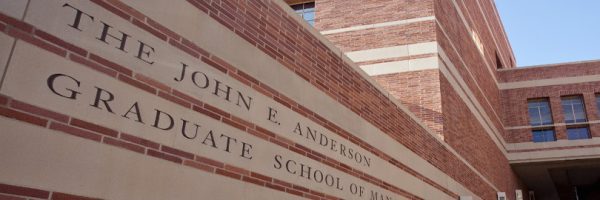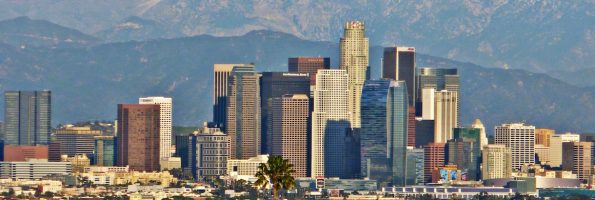UCLA Anderson Team Wins Economist’s NRG Energy Case Study Challenge

UCLA Anderson School of Management’s Blue Team nabbed first place in the Economist’s NRG Energy Case Study Challenge.
UCLA Anderson To Add Business Analytics Degree This Fall

Next fall, the UCLA Anderson School of Management will add a Master of Science in Business Analytics (MSBA) degree program as a possible track for business graduate students.
Social Impact at the Marshall School of Business

When talking about career paths one might pursue after an MBA, most people think of areas like finance, consulting or marketing. Over the past several years, however, MBA students have grown increasingly interested in the business of social impact; according to Business as Unusual, a 2014 Net Impact survey, 88 percent of MBA students report that they’re interested in learning about businesses with social missions and environmental emphases. That’s one reason why the USC Marshall School of Business recently hosted its second annual Social Impact Careers Panel. Continue reading…
Harvard, Stanford Earn Most Annual Business School Applicants

There are so many factors to consider when applying for an MBA program, it can often be overwhelming. Between cost, admissions requirements, location and program quality, narrowing down a select few to focus on for the application process is a challenge within itself. Nonetheless, between the time required to complete an application and the expense of application fees, it’s simply impossible to apply to every program you find interesting. Narrowing your focus to only your top choice schools can save time, money and a load of heartache.
While factors such as those mentioned above, like cost and location, are great ways to help narrow down your options, it is also helpful to take into consideration the competitiveness of each program. For many high-regarded MBA programs, the applicant pool can be so large that only a very small minority of applicants are accepted each year. While it may seem encouraged to “shoot for the stars,” understanding the real probability of your admission to a program can be a crucial factor in deciding whether or not to apply.
Thankfully, the U.S. News Short List, which focuses on particular data points from schools and degree programs around the country, recently compiled a list of MBA programs with the most applicants. As expected, these include some of the top programs in the country all ten programs with the highest applicant numbers were also included among the top 20 schools in the U.S. News 2017 Best Business School Rankings, and eight of them in the top ten.
While these are some of the top programs in the country, more applicants also means more rejections. All ten of these schools have acceptance rates lower than 25 percent, which means the majority of applicants are rejected. For many of these schools, the numbers are staggering. Of the 129 schools ranked this year by U.S. News, the average applicant number was 917. At Harvard Business School, which tops the list of largest applicant pool and the publication’s top-ranked business school in the country, there were 9,686 applicants for the fall of 2015.
Following HBS with the second most business school applicants is the Stanford Graduate School of Business with 7,899 applicants in the fall of 2015 and an acceptance rate of just 6.1 percent. The University of Pennsylvania (Wharton) placed third with 6,590 applicants and a 19.8 percent acceptance rate. Columbia Business School, ranked tenth best business school by the publication, received 5,829 applicants in the fall of 2015 and accepted just 18 percent of its applicants.
Also among the schools with the largest applicant pools were:
- Northwestern University (Kellogg): 4,300 applicants, 5th (tie) in ranking, 20.6 percent acceptance rate
- University of Chicago (Booth): 4,284 applicants, 2nd (tie) ranking, 24.4 percent acceptance rate
- Massachusetts Institute of Technology (Sloan): 4,254 applicants, 5th (tie) ranking 14.6 percent acceptance rate
- New York University (Stern): 3,696 applicants, 20th in ranking, 20 percent acceptance rate
- University of California—Los Angeles (Anderson): 3,533 applicants, 15th in ranking, 19.8 percent acceptance rate
- University of California—Berkeley (Haas): 3,506 applicants, 7th in ranking, 13 percent acceptance rate
Certainly, if you have an extensive resume and strong GRE scores, among other factors, there’s no reason why you shouldn’t be part of the small percentage of accepted applicants to these schools. However, full awareness of the probability of acceptance and competitiveness of each program can be important in narrowing down the schools you choose to apply to. Although these are schools with the largest pools, tracking down information about acceptance rate is a great idea for any program you are considering. For example—the Muma College of Business at the University of South Florida, which had the fewest applicants in 2015, had a 100 percent acceptance rate. If your goal is to save as much time and money as possible as you begin your degree, focusing on schools with high acceptance rates such as this can only make this already complicated process that much simpler.
Top Finance MBAs in Los Angeles

The finance industry has always gone hand in hand in the MBA. Even as MBAs are becoming increasingly popular in other industries, finance is still the biggest MBA job sector and accounts for 22 percent of all MBA jobs, according to the 2014/15 QS TopMBA.com ‘Jobs and Salary Trends Report‘. Continue reading…
Online MBA Programs in Los Angeles

When you need the ultimate in flexibility for your MBA degree, then you want an online MBA. Online courses allow you to complete your education from anywhere in the world. That means that if you have to head out of town for work, you don’t have to stop your MBA. Or if you want to attend an MBA program that’s not near your home or office, an online MBA is the perfect option.
And if you’re not sure about completing your entire MBA online, there are many flex/hybrid MBA options. These MBAs allow students to spend a minimum amount of time on campus—typically about one weekend a month of four days a quarter—while the rest of the program is delivered in an online format. Hybrid MBAs offer the most flexibility alongside the best learning experience.
So, what if you’re interested in an hybrid or online MBA in Los Angeles? Do you have any options? Yes! You have quite a few, though most are hybrid MBA options. Continue reading…
